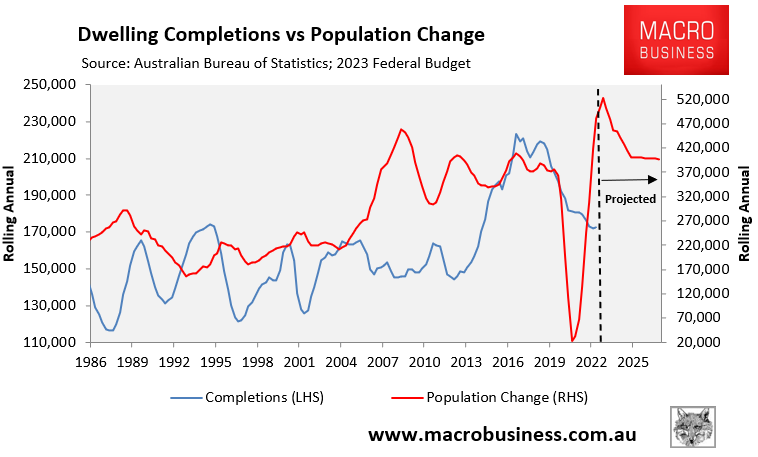Sustainable Population Australia (SPA) has provided an honest take on Wednesday’s National Cabinet meeting on Australia’s housing crisis.
SPA National President Jenny Goldie argues that Australia cannot fix the housing crisis by continually escalating housing demand via mass immigration.
This view is encapsulated by the below chart, which shows that Australia’s dwelling construction increased massively last decade.
However, this supply boost was not enough to keep pace with an even larger increase in population growth from 2005 when net overseas migration was more than doubled:

With the Albanese government ramping net overseas migration to a record high 1.5 million over the five years to 2026-27, which will deliver a 2.18 million increase in Australia’s population over the same period, Australia’s housing crisis will only get worse.
Thus, SPA argues below that Australia’s housing problem is really an excess immigration problem.
According to Prime Minister Anthony Albanese, ‘housing supply and affordability’ will be the key priority when the National Cabinet meets in Brisbane on 16 August.
According to Sustainable Population Australia (SPA), however, to solve the housing crisis, government must deal with housing demand and not just supply.
SPA National President Jenny Goldie notes that 30 years ago Australia had better housing affordability and home ownership than most other developed countries. Now, thanks to two decades of high immigration, it is one of the worst for housing affordability and housing debt.
With the sudden influx of migrants after borders reopened, rental availability and affordability have reached crisis point.
“Cabinet must consider demand as well as supply. Our current rapid growth in population is driving up housing demand. Until it is moderated, there can be no real solutions to the housing crisis,” Ms Goldie says.
SPA’s Housing report found record population growth was creating a perfect storm by worsening existing flaws in the housing market.
“Yet it is increasingly evident that Mr Albanese wants to keep demand at extreme levels. For instance, with no apparent consultation, he signed the open-ended Mobility Agreement with India“.
“His population targets will add roughly ‘another Perth’, or two million people, over five years.”
In May, the Albanese government introduced a Bill to establish a $10 billion Housing Australia Future Fund (HAFF) which will build only 30,000 new social and affordable housing properties in the first five years.
“This only begins to scratch the surface of need,” says Ms Goldie. “We were not keeping up with housing demand even before the current explosion in immigration-fuelled population growth”.
“A rent freeze can only have a beneficial effect at the margin. The same is true of other persistently failed ‘solutions’ – land release, land zoning, and residential density”.
“None will succeed until demand is curtailed and that can be achieved only by bringing net overseas migration (NOM) back down to well under 100,000.”
According to many independent polls, there is continuing voter opposition to more population growth. “Yet the government doubles down, increasing inflows of temporary migrants and expanding access to permanent residence for more of them,” says Ms Goldie.
“We’re used to the spurious claims, for instance, that all-time high immigration levels are an entirely normal catch-up after COVID, or lower than whatever Scott Morrison intended”.
“Now the Treasurer airbrushes massive immigration as ‘not government policy’ and not something he controls”.
“That is a mockery. Just as it is a mockery for the Albanese government to play lip service to ‘housing supply and affordability’ while increasing immigration”.
“It’s about time Australians got a say in immigration and population policy”.

